CHICAGO BLUES
Of stale bread dumplings and sharing recipes with pets

Apparently young chefs have a duty to go into their kitchens and invent an ‘authentic South African cuisine’. That’s a real buzz killer. Next you’ll be telling me moussaka is Greek.
It’s not winter in Chicago. It’s actually summer here in Chicago. How about that? I know my dear editor is going to raise an eyebrow at this because he is firmly of the opinion that we have year-round winters up here. Okay granted, our summers are not very long, but they can be quite brutal. Often in the upper thirties with nearly 100% humidity. Like Durban on steroids.
Chicago is not high above sea level and not counting the Great Lakes, there are more than 15,000 lakes in Illinois, Wisconsin and Michigan. (A lake is generally defined as a permanent body of water with a surface area of eight hectares or more.) A lot of water around, to cause some serious humidity. Strangely though, unlike the southern and western US where temperatures have been in the upper forties, this summer has been really mild, hovering in the upper twenties.
Which is a bit of a problem for me because usually I can spend half my column griping about our foul winter weather to a bunch of sweaty South Africans. Convenient because it spares me from having to do too much food writing. I never seem to have exhilarating food experiences like other regular food writers so what’s a sorry-assed boy from Pretoria like me supposed to write about? To add insult to injury, I made a promise that after my last column I would never mention my mother-in-law again, ever, unless I want to find myself in serious trouble. Admitted, she was an easy target but I swear, I didn’t make any of those stories up. By the way, she’s coming to visit in a week but unfortunately you will never get to hear about it. Sorry.
That leaves Hugo, the malevolent puppy. Well, he’s not malevolent anymore and he’s not a puppy anymore. As a puppy, his sole mission in life was to make my life miserable in the kitchen. But suddenly he’s become a different dog. Turned a new page. Now he wants to spend his time sitting on the kitchen couch reading cookbooks with me. And if you think that’s weird, you’re absolutely right. Something’s up. I wouldn’t trust this pooch as far as I could throw him. I don’t buy this new persona of his. Don’t get me wrong, I’m happy to share recipes with my dog, but there is a hidden agenda somewhere. This mutt is up to something. Anyway, I have his number and will be keeping an eye on him. Maybe he just wants to be a famous chef and I could be completely wrong. Watch this space, as they say…
So it’s an early summer’s morning, everybody is still asleep and I’m sitting here in the kitchen, dunking an Ouma rusk in my Vienna blend coffee, dutifully writing this column, when my eye catches something. As a matter of fact, it didn’t just catch something, I read most of the copy on the back of a cereal box before catching myself. What an early morning buzz killer. I mean, what kind of twisted moron writes this rubbish. And there I was, all bright-eyed and bushy-tailed, ready to start my summer’s day, and I get tripped up by a cereal box.
Pet food packaging, at your peril

Dog food packets on my kitchen counter. (Photo: Chris Pretorius)
Speaking of serious buzz killers, read the copy on pet food packaging at your peril. It’s right up there with cereal boxes. Especially the more “healthy” brands. Your pet doesn’t give a horse’s ass whether the stuff it’s eating was caringly handcrafted in Maine, or lovingly handpicked in Washington State. Or how many types of ancient grain each portion contains. (Same goes for breakfast cereal. What’s with all this “ancient grain” nonsense anyway.) Well, my mutt Hugo doesn’t, despite the fact that he’s now avidly “reading cookbooks”. The dog food bag urges me to up my pet feeding game and kick off my pet’s day with all natural kibble! Let me tell you, the only kick my pet is going to get is not the kind that comes in a bag.
The funny thing is, since my primary school days, I wanted to be a packaging designer when I grew up. Not designing the artwork on the package, but designing the architecture of the package. How the whole thing gets folded, and I’m not talking about origami. I’ve always wanted to say something fancy and arty like “the architecture of a package” in print. Unfortunately it’s the food page and not the art page, but hey.
I remember as a kid, sitting at the breakfast table and absentmindedly but carefully undoing the cereal box. Or any other package close at hand. Used to drive my poor mother to distraction, but she went to more than enough Tupperware parties, so at least she could contain the spillage.
A few years ago I heard an interview with a Nasa scientist specialising in folding, apparently one of the most important areas of space technology. Who would have thought? But apparently it’s hugely important to fold and unfold all kinds of parachutes and solar panels on spacecraft because they get stored in minute spaces. Snap, crackle, pop.
Okay, I know I’m avoiding the subject. Food, not folding. Here goes. A few months ago, I read an interview with a very interesting young South African chef who’s worked in some of the world’s most famous kitchens. He does sound really amazing. But towards the end of the interview, he said something puzzling. According to him, young chefs have a duty to go into their kitchens to invent an authentic South African cuisine. As an example, he cited Rene Redzepi’s Noma in Copenhagen.
The notion of authenticity and food
I have problems with the whole notion of authenticity when it comes to food, as I mentioned in a column a few years ago. And I find the idea of inventing an authentic cuisine problematic. I also find his choice of Noma problematic. Oh God, I seem to be finding everything problematic these days. Maybe I should just make a list of a hundred things I find problematic and call it a column. And then get fired.
As you may know, Noma has for many years been considered the world’s best restaurant, another notion that I find, yes, problematic. (Sorry, I’ll stop.) Noma is the place with a two-year waiting list, and where a tasting dinner for one costs $1,500. That’s if you’re happy to wait two years to taste reindeer moss or asparagus spears covered in white mould. Personally I have no issue with that and it’s also way above my pay grade, but my point is that the average Dane would probably not quite agree with the idea that Redzepi invented authentic Danish cuisine.
I agree that South Africa needs more South African-centred restaurants, but I suspect that if authenticity becomes a criterion, everybody will just end up going down the rabbit hole. Try to create the South African flavours you have in your taste memory and don’t worry about authenticity. Google authentic Greek food and what pops up? Moussaka, of course. Never mind that moussaka was invented in the 1920s by a French-trained Greek chef who considered Greek food a little too unsophisticated and in need of an upgrade.
Which brings me to Alberto Grandi, a professor of economics and food history at the University of Parma, recently declared an enemy of the Italian people by the deputy prime minister, Matteo Salvini. The reason for his notoriety is that his research into the history of Italian food has led him to debunk many myths central to Italian cuisine. He points out that before the twenties, panettone was a hard flatbread with raisins, eaten mainly by the poor and not at all associated with Christmas. In the twenties, Motta, a major food brand, invented the raised dough we associate with panettone in its industrial kitchens, but it only became a popular supermarket staple and linked to Christmas in the seventies.
About Italian culinary identity
What irks most Italians is that Grandi has traced the origins of many traditional dishes sacred to Italian culinary identity, to the US. Oops. He points out that in the early 20th century there was a huge migration from poverty-stricken southern Italy to the US, bringing foods unknown to the rest of Italy with them, and making them staples of the Italian-American table. Mozzarella was a regional southern cheese not eaten in the north. Italian immigrants started producing it in the US on a large scale.
Before the sixties, Parmesan came in small 10kg wheels, not the current 40kg wheels, and was also a relatively soft cheese. Apparently you could squeeze it and a drop of milk would come out. According to Grandi, the most “authentic” Parmesan can now be found in Wisconsin, where immigrants from the Po Valley settled and are still making it the old-fashioned way. Which also says something about Italian Parmesan’s Designation of Origin label.
The first recipe for carbonara was printed in Chicago in 1952. Eat that, Rome, where carbonara is sacred. And then there’s pizza. People have been eating flatbreads with toppings around the Mediterranean for millennia. But pizza as we know it today was a novelty in Italy, until way after World War II. There’s a myth that American soldiers encountered Italian pizza vendors on the streets of Naples, and that’s how the pizza got to the US. In fact, it seems like the opposite is true. Grandi mentions letters by American GIs expressing surprise that there was no pizza in Italy. Canned tomatoes, one of the main ingredients of pizza, is an American invention. As a matter of fact, Grandi’s research revealed that the first ever pizza restaurant opened in New York in 1911, and not in Italy.
Interestingly, even pasta was not common until after the war. Before the war, you were much more likely to find a bean or potato stew on the average Italian table. And it goes on. The absurd thing is that the Italian government is considering establishing a task force to monitor standards of authenticity in Italian restaurants around the world. Now there’s a buzz killer for you.
Even olive oil is suspect, because most Italian olive oil is produced with olives imported from Spain and Morocco. Apparently the Mafia pinches the Italian olive trees and sells them at a huge profit in China. And it’s not only Italy. Except for one or two craft producers, Dijon mustard is not produced in France because French farmers stopped cultivating mustard in favour of higher-yielding crops years ago. Now just about all “French” mustard is produced with mustard seeds that originate in Canada.
Enough Italian stuff. Around the same time I read the interview with the young chef that set me off on the whole authenticity rant, I read an annoying blog by a South African lady that someone posted on FB and got hundreds of likes and positive comments. Basically she was saying South African food is much better than European and American food. I know I’m going to make myself unpopular here, but what rubbish. She seemed to be married to a German banker, and divided her time between Europe and Cape Town. Nice if you can afford it. First she mentioned France, and how terrible and expensive food and service is in Paris. Well, for one thing, France is a big place and there’s more to it than Paris. And yes, there is expensive bad food in Paris, but there is also affordable amazing food in Paris. All you need to do is look around you a little.
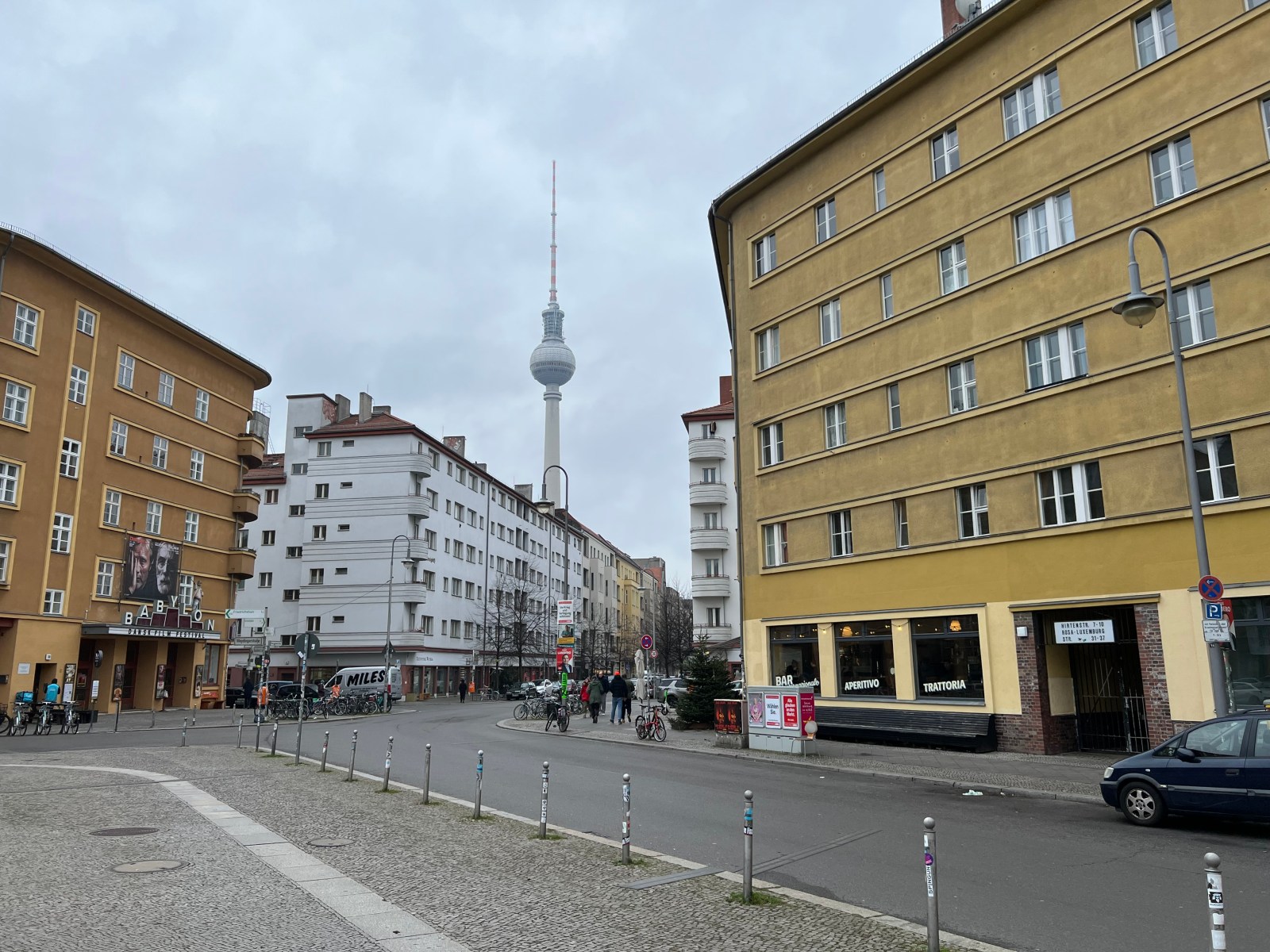
Prenzlauer Berg in the former East Berlin. (Photo: Chris Pretorius)
But Berlin came in for a serious drubbing. According to her, the only food available in Berlin is eisbein, boiled potatoes and sauerkraut. What nonsense. I’ve had wonderful food in Berlin. As a matter of fact, you have to be stupid not to find good food in Berlin. And then of course, she went on about the brilliance of South African food. I’ve been back to South Africa many times and I’ve had great food there. I’ve also had terrible food and service there. As the years go by I’ve started seeing South Africa more and more as a tourist during my visits, and it’s given me an interesting perspective.
Being South African doesn’t make me special
What actually annoyed me wasn’t her opinions because she’s entitled to them of course, ill-informed as they were, but the enthusiastic response she got. I think many South Africans should just get over themselves and relax. It took me many years living in a foreign country to realise that being South African doesn’t somehow make me special. South Africa is special to me because I was born there but in the end it’s also just another country. One of many other countries. And I don’t mean to be offensive, but it’s probably a healthy point of view to adopt.
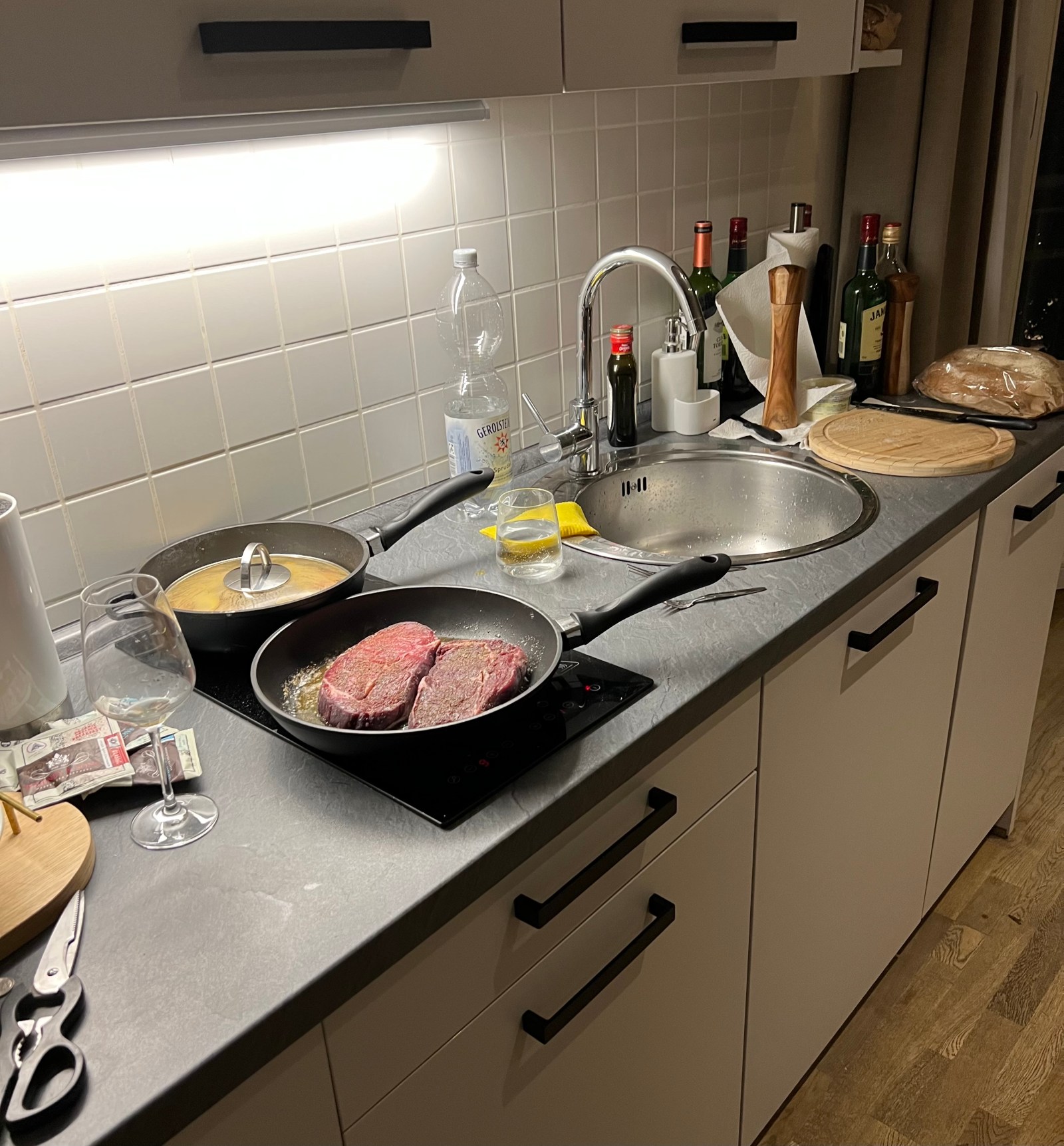
My little Berlin kitchen. (Photo: Chris Pretorius)
Speaking of Berlin, back in January, Willem did a one-month German language course at his college’s Berlin campus, and on the spur of the moment we decided to go and meet him on his last day, and hang out in Berlin for a few days. Found a nice apartment with a kitchen in Prenzlauer Berg, and to my delight there were four supermarkets within a few blocks’ radius from us. Three in the afternoon, and our luggage had barely hit the floor and I was, to Jill’s annoyance, ready to hit the supermarkets. Anthony Bourdain famously said, drink with the locals, and I totally disagree. Tried that all over the place: Portugal, Spain, even Holland, only to get glared at suspiciously and sometimes not even served. It’s one thing being Anthony Bourdain and waltzing in with a camera crew in tow, another thing just being a non-local. Boy in a bubble syndrome.
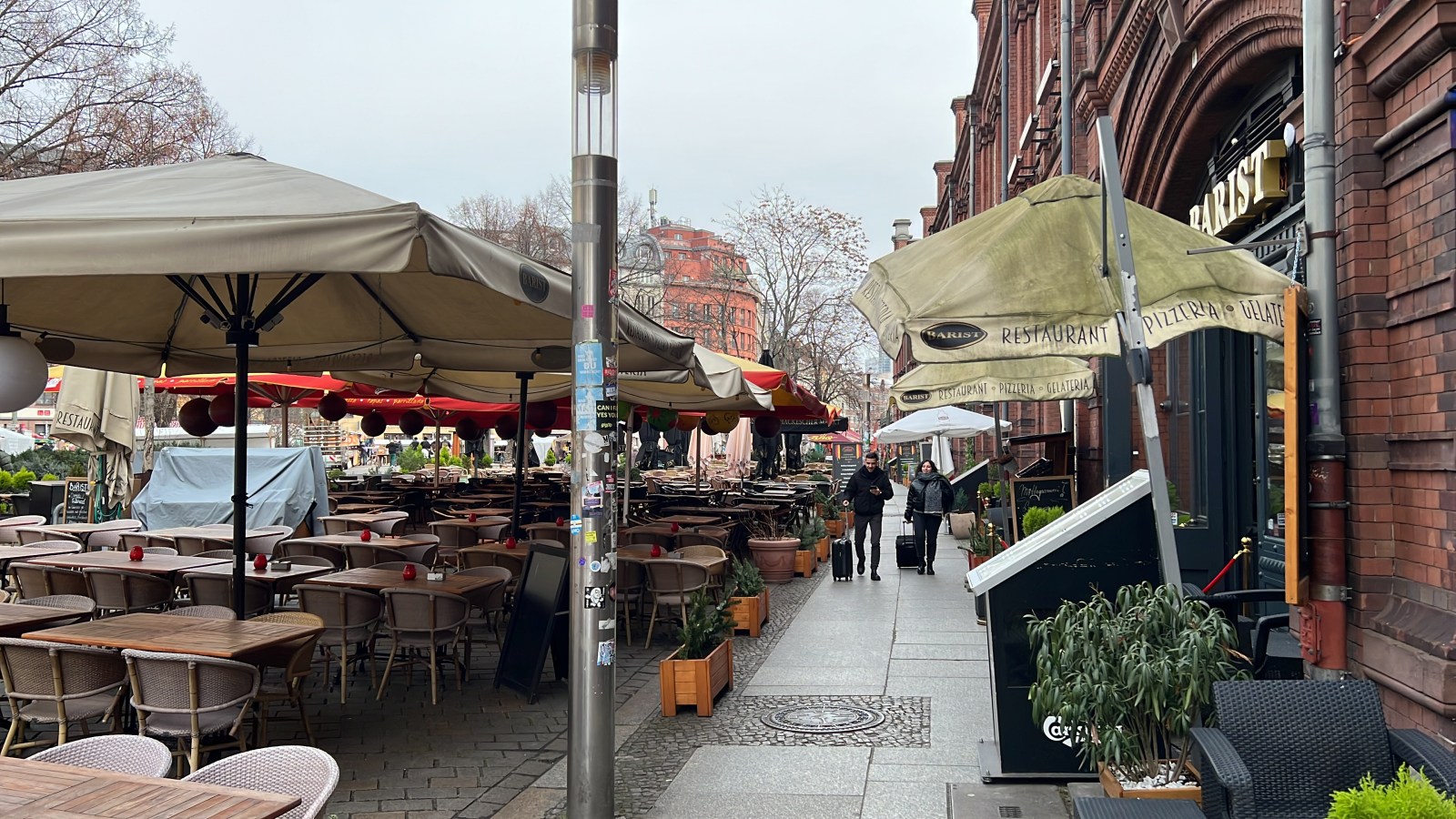
Mid winter sidewalk tables. Can’t say the Berliners aren’t optimists. (Photo: Chris Pretorius)
Inner city supermarkets are where you see the locals. People in supermarkets really have their guard down. Popping in on the way back from work, grabbing stuff for dinner, running in to grab a pint of milk or a loaf of bread and a few bananas. Supermarkets are where you get the feel of a city, not the local pubs or bars or the fancy food markets. And I love to see what’s on the shelves. All the normal, mundane things but exotic to me as a foreigner. Then bringing all my loot back and cooking dinner in a strange kitchen. Much better than wandering around in a strange neighbourhood and ending up in a mediocre restaurant.
About 20 years ago, around the time Willem was born, we figured out that having a place with a kitchen when travelling is the thing to do. And strangely, cheaper, if it’s three of us. So generally, on the road, I make breakfast and dinner and we have lunch out. I need to add here that seeing bleary-eyed individuals masticating and slurping coffee first thing in the morning is very unappealing to me. Now there’s an early morning buzz killer for you. I’m just not a sharing person when it comes to breakfast. As a matter of fact, my worst nightmare is having brunch with friends. Just leave me bloody alone in the mornings already. Or even better, keep coming with those Bloody Marys.
Berlin has the worst service
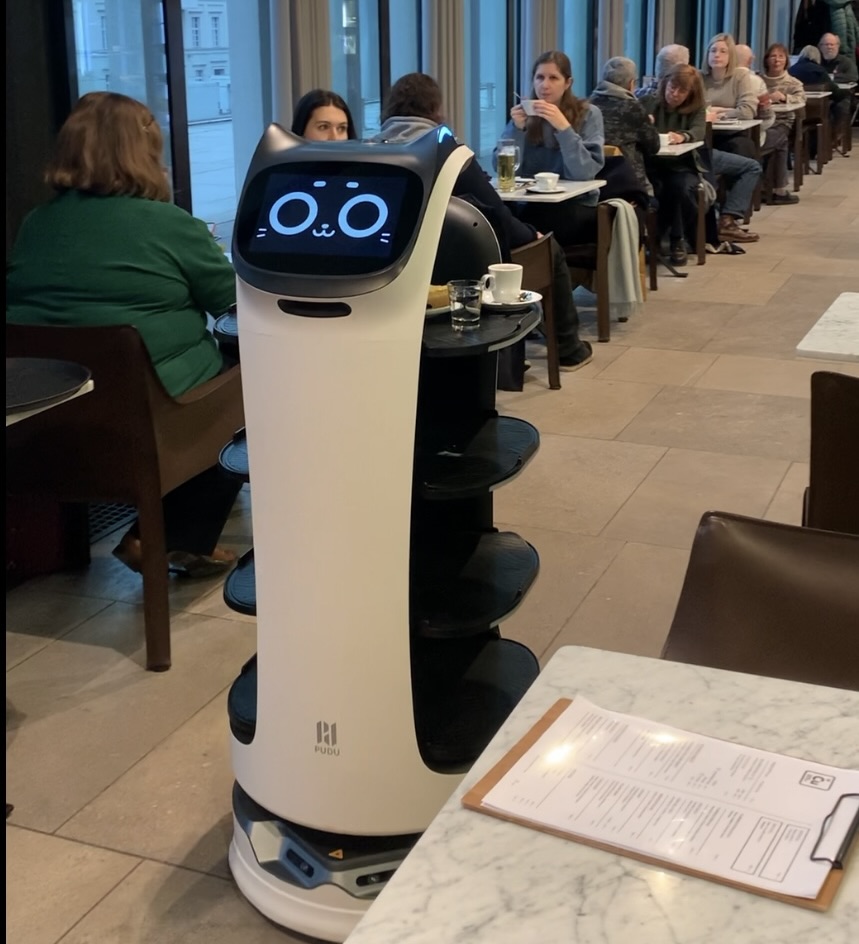
Super friendly robotic server in the Pergamon restaurant. (Photo: Chris Pretorius)
I’ll tell you one thing though, although lunch in Berlin was perfectly fine, the service was not. After Switzerland, Berlin has the worst service I’ve ever experienced. In France, waiters will ignore you and not make eye contact until they decide to serve you, no matter how much you wave your arms. It’s nothing personal. It’s just how they do things. Berlin is different. There it feels like the servers actively resent your presence in their space, conveniently ignoring the fact that you are paying their salary. What a sullen bunch. And don’t even try to ask a museum guard a question. They will actually scowl and snap at you to go and find a map. Funny enough, it was in the Pergamon Museum restaurant that we encountered the only friendly service during our Berlin stay. Only problem is that it was a robot. But at least it gave us a friendly greeting and told us to enjoy our visit before scooting off, all flashing lights and bleeping sounds. A glimpse of the future, I suppose.
Wandering around Berlin in winter is great. Not a tourist in sight. Another thing about winter is that all the museums and galleries are open but empty. We had entire museums to ourselves. Our German friends were all surprised that we would even consider visiting Berlin in the winter, until we reminded them that we’re from Chicago and that we found the Berlin weather quite enjoyable. Unbeknown to us, we escaped a major blizzard in Chicago.
We were just settling into Berlin when Willem started lobbying to go to another city. He wanted to go to Warsaw, but a nine-hour train ride was just not going to happen. Then he settled on Prague, a three-hour train ride. What the hell. First class train tickets were $52. And off we went. I love those trains with decent dining cars where you can get a drink and a fairly decent meal and watch the Vltava river go by. I just love trains, period.
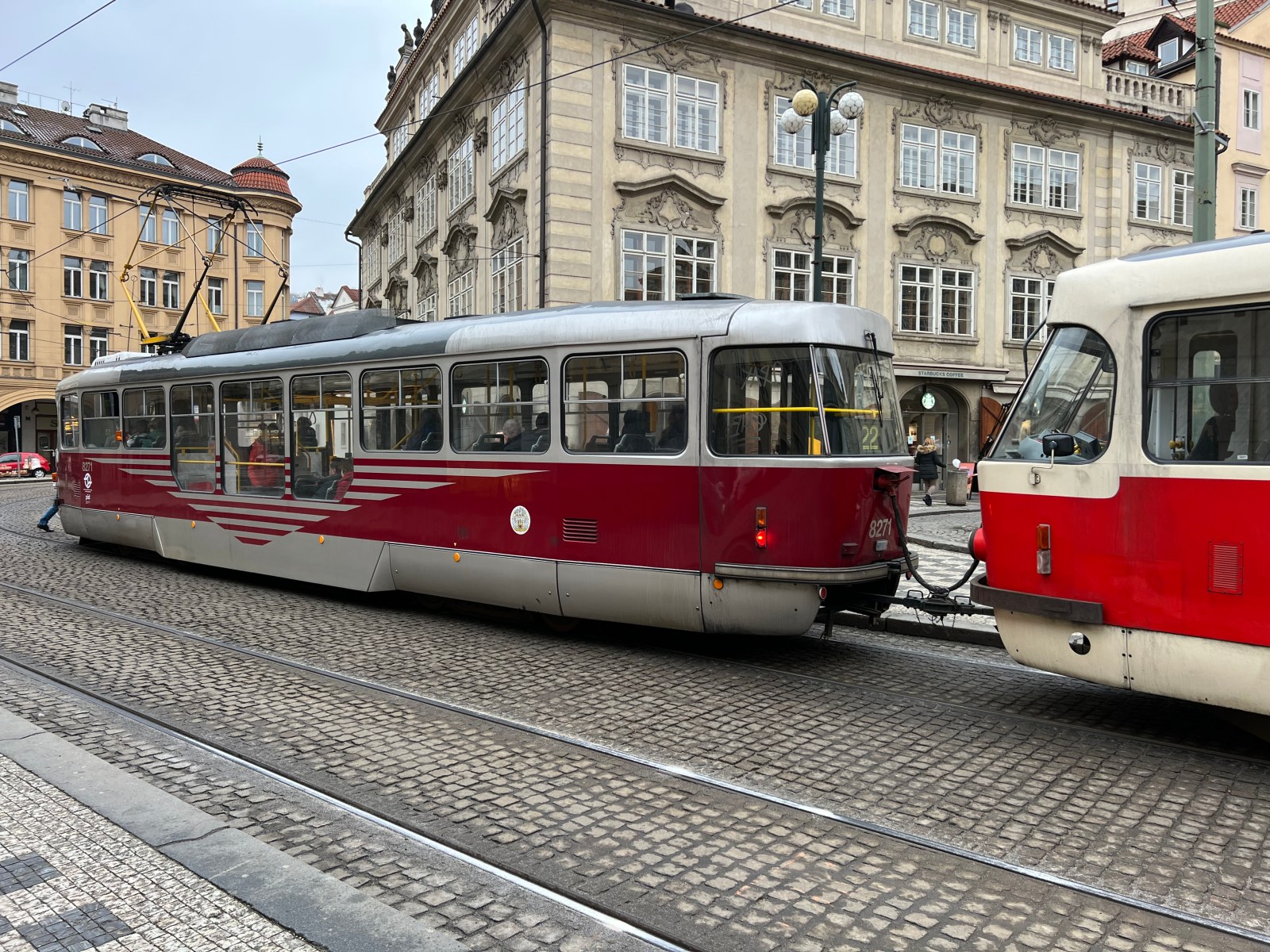
Cold War era trams in Prague. (Photo: Chris Pretorius)
Turned out our hotel was right under the tower that leads onto the Charles bridge. So, early February, mid-winter in Prague, and not a tourist in sight. What a beautiful city. And the Cold War era trams are amazing. They made me want to be in a spy movie. Actually, my second career choice, after packaging designer, was to be a spy. I couldn’t get enough of the trams. Willem and I even took a whole tram route back to where Jill patiently sat waiting for us, just for fun. That’s what I call cheap thrills.

The pink building right by the Charles Bridge was our hotel in Prague. (Photo: Chris Pretorius)
The food in Prague is something else though. And not in a good way. Everywhere you go you are told that to experience the real Prague you have to try authentic Czech food. Goulash with bread dumplings, schnitzel or duck. I like goulash, but Hungarian goulash. The Czech version is just plain bland. And bread dumplings taste like steamed balls of stale bread. Schnitzel is schnitzel. And you can only eat so much rich braised duck. It’s more a once-a-year kind of meal. And it’s everywhere. Every restaurant had the same menu. Authentic Czech food! Goulash with bread dumplings, schnitzel or duck. I started seeing bread dumplings in my dreams. I started craving a burger and chips, something I rarely do. In desperation, I started scanning the streets for the telltale neon Golden Arches sign. Perhaps I should take my earlier words back and suggest that some young chef head over there and invent a new authentic Czech cuisine for them.
The beer was another matter. Man, can those Czechs make good beer. I started skipping the authentic menu and going straight for the beer. All the nutrition I needed. I must say, it’s truly amazing that those people can live off a diet of beer and dumplings and not end up looking like dumplings themselves. Their secret might be smoking. Everybody lights up. It’s like the news that cigarettes may be bad for your health has not penetrated that far east. Restaurants have a no smoking rule that everybody ignores. Their only concession is to kind-of hold the cigarette under the table. Only foreign suckers go outside for a quick puff in the cold.
And then it was back to Chicago, speaking of cold. The train from the airport stops three blocks from our house, which doesn’t sound like a big deal, right? So we get above ground and it’s dark with a blizzard just getting under way, catching us totally off guard. We were dressed for a balmy European winter, not a Chicago blizzard. No furry hats, mittens or parkas. So we stumbled home, gale force winds blowing ice sideways into our faces. Snowdrifts up to our ankles. And guess what? Not a European tourist in sight. We had the street to ourselves. By the time we made it to our front porch, I was promising myself never to make fun of bread dumplings again.
Anyway, next time you hear from me, it probably will be winter again here in good old Chicago. DM





🙂 🙂 🙂